- Buy the Book Commander of the Faithful
- High-resolution version of book cover art
- High-resolution version of author photo
Why a Book About an Obscure Arab Hero?
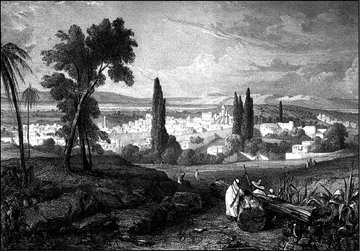
Mascara around 1830
History, according to the truism, is written by the victors. Yet, it was the French victors who paid homage to the moral, intellectual and spiritual qualities that made Abdelkader a widely recognized “ great man” of the mid 19th century. Emir Abdelkader inspired respect from Missouri to Moscow. His story is about many things, but ultimately it is about struggle: struggle against French invaders, struggle with Arabs who rejected his leadership, struggle with depression and despair in French prisons, struggle to live as a good Muslim.
Today, he would be dismissed by many in the West as a “fundamentalist”-- a label signifying to the secularist a retrograde, narrow-minded, extremist. He was indeed a fundamentalist in this sense: To be rightly guided meant only one thing for him—to do God’s will according to the teaching of the Koran and the traditions of the Prophet. He was also a man of great intellectual curiosity, marked by Greek thought, who squared his faith with a deep humanity and a progressive belief in the value of knowledge to improve lives. For him there was no contradiction between faith and reason, or between a rigid orthodoxy and acknowledging the diversity of God’s ways. Nor was there a contradiction between being a puritanical, Law-abiding Muslim and a compassionate humanitarian who respected the accomplishments of European culture.
Abdelkader’s story is part of a larger one of European arrogance and greed masquerading as a “civilizing” force. Abdelkader’s resistance to French imperialism and France’s belief in its own virtue and the superiority of its civilization has many parallels with America’s efforts to democratize the Arab world today. America failed once before to learn from France’s experience. Then it was Vietnam; today, the Arab world. The story of France’s poisonous struggle in Algeria offers guidance for Americans today. Abdelkader’s mixture of strict orthodoxy, spirit of inquiry, rigorous self discipline and compassionate humanity is a warning to those who think in stereotypes.
FROM THE INTRODUCTION
…Such is the history of the man for whom our town is named. A scholar, a philosopher, a lover of liberty; a champion of his religion, a born leader of men, a great soldier, a capable administrator, a persuasive orator, a chivalrous opponent; the selection was well made, and with those pioneers of seventy years ago, we do honor The Sheik.
Class of 1915, Elkader High School, Iowa
“What kind of name is that?” newcomers ask. Settlements in the American West were typically named after Indian tribes, army forts, biblical references or the Old World origins of the pioneers. Iowa is typical. Its map is speckled with places such as Norway, Rome, Moscow, Jericho, Luther, St. Anthony, Lourdes, Holy Cross, Fort Dodge, Osage, and dozens of -burgs and -villes. All the more remarkable that there is a town in Iowa called Elkader.
They call themselves “Elkaderites,” which sounds disturbingly like El Qaeda-ites. But they are neither admirers of Osama Bin Laden, nor relatives of the Jebusites or Amorites, or some other Old Testament tribe. Elkaderites are unique. Theirs is the only town in the United States named after an Arab.
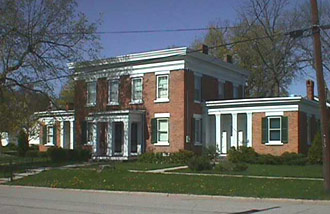
The Carter House, Elkader, Iowa
The man responsible for planting the name of a distant Muslim warrior in the rolling farmland of northeastern Iowa came from Utica, New York. The archives of the Clayton County Historical Society say Timothy Davis was born in 1794 when Utica was still a rugged wilderness, instilling in him “ habits of frugality and industry” as well as “pluck and energy to battle the world.” Following the westward march of the time, Davis settled in Dubuque in 1836, then still the Louisiana Territory. He practiced law and made a name for himself defending settlers who were being prosecuted for cutting timber on government lands. Davis’s speaking ability, lively mind and knowledge of international affairs made him a respected local personality whose advice was sought on diverse subjects.
In 1846, Davis had concluded a business venture with his two law partners to acquire property north of Dubuque. A site on the Turkey River was ideal for a flour mill. Together, they laid out a new town plan centered around the future mill. His partners, Thompson and Sage, gave the honor of naming the new town to their friend.
Davis surprised them. Thanks to Littell’s Living Age, he had been following from afar the exploits of a “daring Arab chieftain,” named Abdelkader. This popular digest of the British and American international press had been cheering on the Arab sheik in his long struggle against the French colonization of Algeria. Memories of the American rebellion against British imperialism were fresh enough for Davis to see in the emir’s resistance a freedom-fighting cousin. So Timothy Davis, a pioneer spirit, respected lawyer and distant admirer of this resilient underdog, named the new settlement after Abdelkader, wisely shortened for American tongues to Elkader.
Fourteen years later, another American would honor Abdelkader as a great Muslim and great humanitarian. This time it would be President Abraham Lincoln…
I am often asked how I learned of the emir and why I became interested in him. Abdelkader’s story is actually a sequel to The Monks of Tibhirine: Faith Love and Terror, a book I wrote about Trappist monks in Algeria whose kidnapping and gruesome death riveted France in 1996. Their monastery in the hamlet of Tibhirine lay on the slope of a mountain with a steep cliff face called Abdelkader Rock.
Curious about the name, I was told Abdelkader was the Algerian George Washington, the father of modern Algeria, who had once directed a battle from the top of the mountain. Abdelkader was the first Arab to create a semblance of tribal unity in order to combat the French occupation. But in defeat, I noted a resemblance to Robert E. Lee. He was gracious, magnanimous, respected by his enemies, and deeply religious. As I learned more about Abdelkader from admiring Catholics in Algeria, I realized that the monks and Abdelkader shared a similar view of God, followed similar communal rituals, even dressed alike, and that their faiths found both a real and symbolic fraternity in Tibhirine.
One day a Catholic sister in Algiers gave me a copy of an excerpt from Abdelkader’s Spiritual Writings which she kept handy in her office.
...If you think God is what the different communities believe—the Muslims, Christians, Jews, Zoroastrians, polytheists and others—He is that, but also more. If you think and believe what the prophets, saints and angels profess—He is that, but he is still more. None of his creatures worships him in his entirety. No one is an infidel in all the ways relating to God. No one knows all God’s facets. Each of his creatures worships and knows him in a certain way and is ignorant of Him in others. Error does not exist in this world except in a relative manner.
No wonder the Catholics in Algiers admired him. Abdelkader had enunciated the spirit of Vatican II one hundred years before Pope John XXIII wrestled new, inclusive, and revolutionary declarations from the leaders of the Church: The Kingdom of God is bigger than the Church; salvation is ultimately a mystery. Abdelkader’s God lived in a big tent. No religion possessed God. I liked this Arab’s way of looking at his Creator and the different religions.
The French monks in Algeria liked to say: La richesse, c’est la différence. We learn about ourselves by taking note of the other. Living amid pious, friendly Muslims, the monks became better Christians. Likewise, Abdelkader became a better Muslim by his friendship with Christians while moldering as a prisoner in France a hundred years earlier.
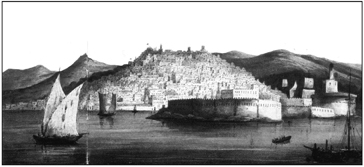
Algiers circa 1830
His resilience and ability to cope with defeat, betrayal and despair, and still live in an exemplary manner, was something I admired. Could I not learn from his life? The term “spiritual journey” has become overused and trivialized, yet who is not on a journey, spiritual or otherwise? Are we not all seekers of something? But are we seeking the right things? How do we get them? What do we have if we do get them? How do we react when life throws unexpected boulders in our path? Abdelkader’s tradition gave a simple answer. Seek knowledge, for knowledge also leads to right conduct. For the emir, knowledge is of two kinds: knowledge of external things, which he compared to pools of rainwater that come and go, and inner knowledge—the knowledge of the soul, the divine presence within us, which is like a fountain that never goes dry.
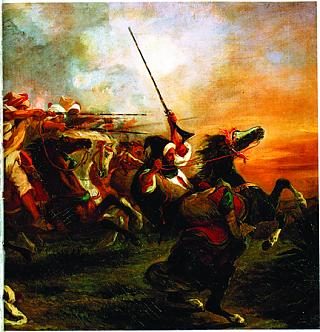
Arab Horsemen in Battle
Then came 9/11. An already bad image of Arabs and Muslims became even worse. A “good Arab,” or a “good Muslim” story seemed more than ever worth retelling in a world being rapidly polarized around false differences. After the U.S. invasion of Iraq, it seemed to me that the French experience of occupying Algiers, “liberating” it from the Turks, fighting Abdelkader for fifteen years while trying to win the hearts and minds of Muslims —all this offered badly needed knowledge of a world that is new to Americans, yet in its tribal and religious complexity has not changed much since the 1830s.
For France today, Algeria is a world full of bittersweet memories, though mostly bitter; a world of toxic, hate-filled struggles that pitted French against Arabs, Arabs against Arabs, and Frenchmen against each other that lives on today. It is a history that helps explain the deep misgivings of our nation’s oldest ally toward America’s “civilizing” adventure to uplift people who share many of the same basic values and needs, but whose culture mixes them in quite different proportions.
In addition to Abdelkader’s, there were wise French voices of that era—minority voices that were overwhelmed by combinations of racism, greed, stupidity, and nationalistic arrogance. They, too, are part of this story, one that is merely the opening chapter of a struggle that continues in Algeria today where the emir’s memory is invoked by all sides.
Did You Know?
- In 1846, a village in the Missouri Territory was named after the Emir. Today it's known as Elkader, Iowa.
- The emir's regulations for the treatment of his prisoners were a Koranically correct forerunner of the Geneva Convention.
- Citizens of Bordeaux put Abdelkader's name on the ballot as a candidate in the French presidential elections of 1849.
- A horse named Abdelkader (called 'Little Ab' by the racing public) was twice winner of the British Grand National Steeple Chase.
- "Allowing for certain exceptions of a theological nature, there is no Christian virtue that Abdelkader does not practice to the highest degree," wrote Dominican Sister Natalie who cared for the emir's family in prison.
- The emir's most influential biographer was a descendent of the Duke of Marlborough, Col. Charles Henry Churchill, British military attaché in Lebanon.
- The Suez Canal would not have been built in 1869 without Abdelkader's influence among the Arabs, and support for the French project.
- President Lincoln honored Abdelkader as a great humanitarian for saving thousands of Christian lives in 1860.

PART I From Marabout to Emir, 1808-1834
Chapter 1. A General in the Dock
Chapter 2. Lords of the Tent
Chapter 3. Unity and Complexity
Chapter 4. Arrival of the Infidel
Chapter 5. The Obedient Son
Chapter 6. France’s New Ally
PART II Good Will, Bad Will, 1834-1847
Chapter 7. Building an Islamic Nation
Chapter 8. The Wheel Turns
Chapter 9. “He Looked like Jesus Christ”
Chapter 10. An Uneasy Peace
Chapter 11. The Emir’s Frenchman
Chapter 12. Jihad
Chapter 13. Total War
Chapter 14. Trail of Tears
Chapter 15. Mischief Makers
Chapter 16. Men of Honor
PART III Exile and Honors, 1848-1883
Chapter 17. Betrayal
Chapter 18. “The View Is Magnificent”
Chapter 19. A Prison Fit for a King
Chapter 20. Liberation
Chapter 21. The Emir’s Letter
Chapter 22. The Road to Damascus
Chapter 23. All for One
Chapter 24. Distinguished Misfits
Story Summary
Practicing its own brand of gunboat diplomacy, France occupied Algiers in 1830 with a force of 30,000 soldiers. Greeted at first as liberators by Arabs unhappy with decadent Turkish rule, the ignorance, arrogance, and broken promises by the French occupiers soon alienated the population. Two years later, tribes in the province of Oran elected Abdelkader’s aged and reluctant marabout father, Muhi al-Din, to lead a jihad against the intruders. His first act was to abdicate in favor of his twenty-four year old son.
By 1832, Abdelkader’s bravery in battle, intellectual mettle and religious piety had demonstrated that he was prepared for the role his father unexpectedly cast upon him. As a youth, Abdelkader excelled at everything he did. Muhi al-Din believed his son was a prodigy with a divine destiny that required a thorough grounding in Islamic law, as well in mathematics, philosophy, rhetoric and medicine. Horsemanship and hunting were essential for building character, especially courage and patience. To expose Abdelkader to the world’s diversity and complexity, Muhi al-Din took him on a two-year pilgrimage, stopping in Alexandria, Cairo, Mecca, Damascus and Baghdad. Abdelkader’s first loves were prayer and study, yet he was also prepared for military combat.
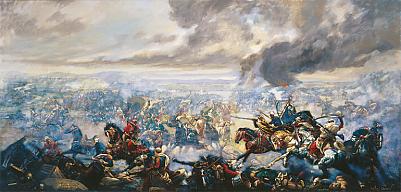
Battle of Machta, 1835
A resilient and divinely inspired Abdelkader won the begrudging respect of his French adversaries and the admiration of English onlookers during his fifteen-year struggle. His best weapons were his diplomatic astuteness, his desert hardened horses and his Jewish intelligence network that kept him aware of political attitudes in France toward its poorly conceived African adventure.
Faced with French determination and scorched earth tactics against tribes supporting him, Abdelkader decided further resistance would cause only futile suffering. In December 1847, he negotiated a truce with veteran General Lamoricière. The terms: the general’s written word, confirmed by the governor general of Algeria (King Louis-Philippe’s son), agreeing to send him into Middle Eastern exile in return for his promise to never return to Algeria.
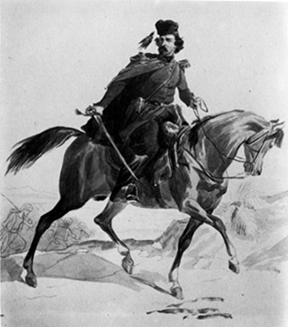
General Lamoricière
The Second Republic, born two months after Abdelkader’s surrender, disowned the agreement of the monarchy. The new government tried to save face by bribing him to release France from its word. Unmoved by offers of luxury living in France, he insisted on holding France to the word of its generals. Twenty-five members of the emir’s entourage died in clammy royal prisons from disease and despair---victims of French politics in which popular opinion distrusted the emir’s word, and weak governments lacked the courage to honor its predecessors’ commitments. In 1852, Abdelkader was liberated thanks to an admiring President Louis Napoleon and a lobby of Catholic clerics, intellectuals, military officers and former prisoners whom the emir had treated with unexpected humanity. Abdelkader was sent to Bursa in Turkey on a generous French pension where he lived for two years; then to Damascus where he was enthusiastically received by the Arabs and joined the mixed Jewish, Christian, and Muslim intellectual stratum of the city.
On July the ninth, 1860, his life of prayer, study and teaching was shattered. Angered by rebellious Christian minorities who refused to pay their taxes, Turkish authorities instigated reprisals that turned into a virtual pogrom. The emir converted his huge home into a sanctuary for the European diplomatic community whose embassies were the first targets of the violence. He and a band of Algerians plunged into the nearby Christian neighborhood and brought thousands to the safety of his residence. Two days later, an angry mob at his door demanded he turn over the Christians. Abdelkader refused, saying it was against the teachings of Islam to kill innocents. The crowd melted away in the face of his determination to defend those under his protection.
After the riots, Abdelkader was credited with saving 10,000 lives, including those of the American, British, French and Russian consuls. Hailed throughout Europe, Russia and America as a great humanitarian, he received the French Legion of Honor, gifts from Pope Leo IX, President Lincoln, Queen Victoria, and other heads of state. His most valued accolade, however, was a letter from Chechen Emir Shamil, who praised him for his courage to do what his faith required--to protect the innocent.
During the last twenty years of his life, the emir became a spiritual bridge between the European and Muslim worlds, epitomized by the role he played garnering Arab support for the Suez Canal project and his participation in the Masonic movement. Defying the skeptics, Abdelkader remained true to his word and never returned to Algeria. Upon his death in 1883, the New York Times hailed him as “ one of the few great men of the century.”
